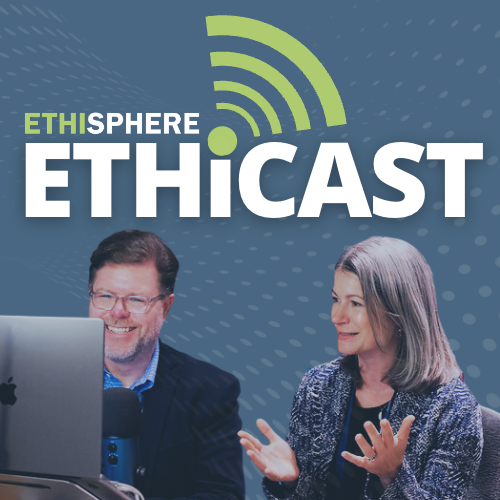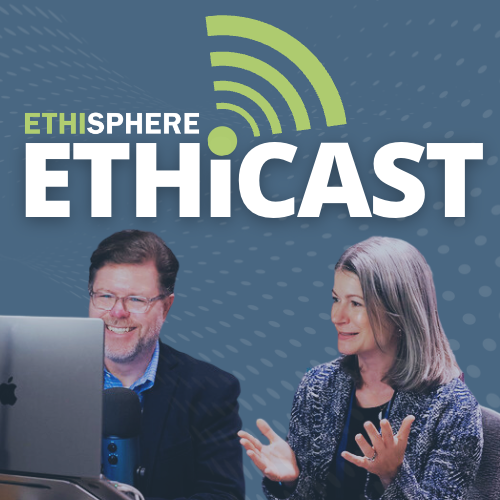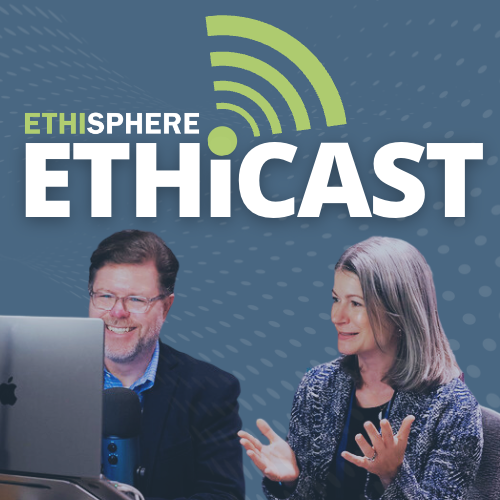[00:00:00] Hi everyone. When it comes to advancing business integrity, culture is king. And in the new issue of Ethisphere magazine, we dive deep into how you can best measure your culture and analyze opportunities for improvement. I'm your host, Bill Kaufman. Welcome to another episode of the Ethicast.
[00:00:28] Larry Sen, the corporate culture pioneer, said that culture is not an initiative. Culture is the enabler of all initiatives. We couldn't agree more. Fact Companies with strong ENC programs outperform their peers. Fact Companies with strong cultures build better ENC programs. Fact Companies that measure their culture know how strong their culture really is. Culture is as complicated as it is vital, which is why we have focused the latest issue of Ethisphere magazine on the finer points of culture measurement with insights from the Ethisphere Data and Services team on how updates to the Culture Quotient Questionnaire will make your surveys more successful, how using shorter, more frequent pulse surveys can help you dial in on particular areas of your culture, and hard won wisdom from the team on what separates a good culture survey from from a great one.
[00:01:22] Survey fatigue, deeper insights and a stronger business case for culture measurement are all driving substantial changes in the language that Ethisphere uses in its Culture Quotient surveys, including the launch of a new line of smaller, lighter pulse surveys. For more than a decade, Ethisphere has helped companies measure their cultures through the Culture quotient questionnaire, or CQ, a 40 question deep dive into how employees view their culture. In that time, though, Ethisphere has identified three key challenges facing organizations that want to measure their culture. The first is survey fatigue, the second is a desire for deeper data insights, and the third is a need to make the business case for measurement. So at the beginning of 2025, Ethisphere rolled out substantial language changes in the CQ itself and launched a new line of shorter 10 question pulse surveys to help organizations everywhere address these challenges. More on those pulse surveys in a moment. Now the CQ is still based on the foundational eight pillars of an Ethical Culture document that companies lean on to dissect and diagnose their own ethical culture. But the prime mover behind these CQ changes is that folks are struggling to get employees to engage in these types of surveys on account of what they're calling survey fatigue. So the CQ now features refinements to make the survey taking process easier as well as questions that get at the truth behind survey fatigue. Which really is this. Most companies don't have a survey fatigue problem, they have an under actioning problem.
[00:02:52] The CQ also features new questions that add depth and detail behind why employees do or don't report misconduct, as well as what people consider to be key pieces of encouragement for reporting misconduct, such as support from their managers or from their peers.
[00:03:07] Alongside all of this, there are now a variety of more lightweight pulse surveys that serve a variety of use cases. One is for less mature organizations where a pilot program needs to be run. In such a case, a 10 question temperature check might be more feasible than Ethisphere's full 40 question dive into Ethical Culture the big advantage of Pulse surveys is that they're much more focused in their topics and are often received by a smaller population. They tend to be shorter in length, requiring only a minute or two from those who have been asked to take them. Importantly, focusing on an area of opportunity in your organization's culture communicates to employees that you have heard their feedback and are addressing their concerns.
[00:03:48] Organizations typically run Pulse surveys between their full culture surveys to focus on areas of opportunity. While pulse surveys are often administered on a more frequent basis than full culture surveys, the way they specifically target certain topics or cohorts within your organization means that they do not contribute to the kind of survey fatigue that challenges lengthier company wide surveys.
[00:04:11] Over the last 10 years, Ethisphere's culture team has also surfaced some insightful best practices about each phase of the culture survey process from start to finish. We dive deep into this in the winter issue, but here's an overview. First, timing is everything. When organizations aim to measure employee perceptions of ethical culture at scale, the timing of the effort is just as critical as the survey itself. Misaligned timing, whether with business priorities or competing initiatives, can significantly impact participation rates and the credibility of the data that you collect. To ensure that your survey doesn't compete with the business plan, carefully avoid launching during common vacation periods, major holidays, or busy sales pushes such as quarter or year end periods. Also seize opportunities to survey employees when it's easier for them to engage, like on the heels of mandatory training or during an ethics week. Align your survey effort with your employees schedules, not against them. Thoughtful timing can dramatically improve your participation rates and by extension, the quality of the insights that you gain.
[00:05:17] Second, don't weigh down your culture survey with excessive demographics. Demographic data and culture surveys is great, but complex demographics with many unique groups within a single category can be challenging to analyze and or yield groups of responses that are too small to be actionable. Many organizations want to deliver actionable data to managers throughout the enterprise to empower them to make meaningful change for their local team. But if data segments get too small, they cannot be analyzed because it risks compromising the anonymity of of the survey. Furthermore, providing meaningful data and guidance to huge numbers of local leaders can take months. Third, make your questions crystal clear. Ethical culture surveys are meant to build stronger cultures, not undermine trust. But your survey won't deliver the results you want if you don't ask clear questions or make plain how survey data will be used. Respondents often express concern over anonymity. They the intent behind the survey and how their feedback would be used. In particular, vague questions about leadership can really rattle respondents who might worry that their feedback could be unfairly interpreted to target the wrong group. A single, poorly designed question can result in respondents abandoning your survey altogether, which impacts response rates and the overall usefulness of the data.
[00:06:35] And finally, be ready to take action on your culture survey results. Knowing what to do after the survey concludes is just as important as survey timing, data layering and clarity. More than a few culture surveys have been undone because there wasn't a clear action and communication plan in place once the survey results came in. This step in the process is fundamental for future employee engagement, response retention, and of course, trust. After being asked to take a survey and providing honest feedback and employees want to know that their responses are being taken seriously and will create long term change. By communicating clear actions in response to results, employees feel heard and the organization proves a commitment to improvement. The bottom line is that survey results are just data and data without action is useless. Action plans take employee feedback and transform it into tangible steps for the betterment of the organization.
[00:07:32] Whether these action plans detail policy updates, new communications efforts, or new targeted training, they should be clearly linked to the survey results to show employees that their invoices were heard.
[00:07:44] Now, I know we've covered a lot in this episode, but this only scratches the surface of the Winter 2025 issue of Ethisphere magazine, which features content from Ethisphere, Athena, Major, Lindsay in Africa, Design it and more. The Winter issue is available now, so download your free copy
[email protected] or just click on the link in this episode's show Notes this show is about showcasing excellence in action and the best thought leaders in the ethics and compliance community. If you'd like to appear as a guest on the ethocast to share a best practice success story or proof point on how business integrity builds value, we would love to hear from you. Drop us a line at the links in this episode's show. Notes I'm Bill Coffin and this has been the Ethicast. We hope you've enjoyed the show. For more content like this every week, please subscribe here on YouTube, Apple Podcasts or Spotify. You can also get our free weekly
[email protected] ethicast and for even more free content, please visit the Ethisphere Resource center at ethisphere.com resources. Thanks so much for joining us. And until next time, remember, strong ethics is good business.
[00:08:56] It.


